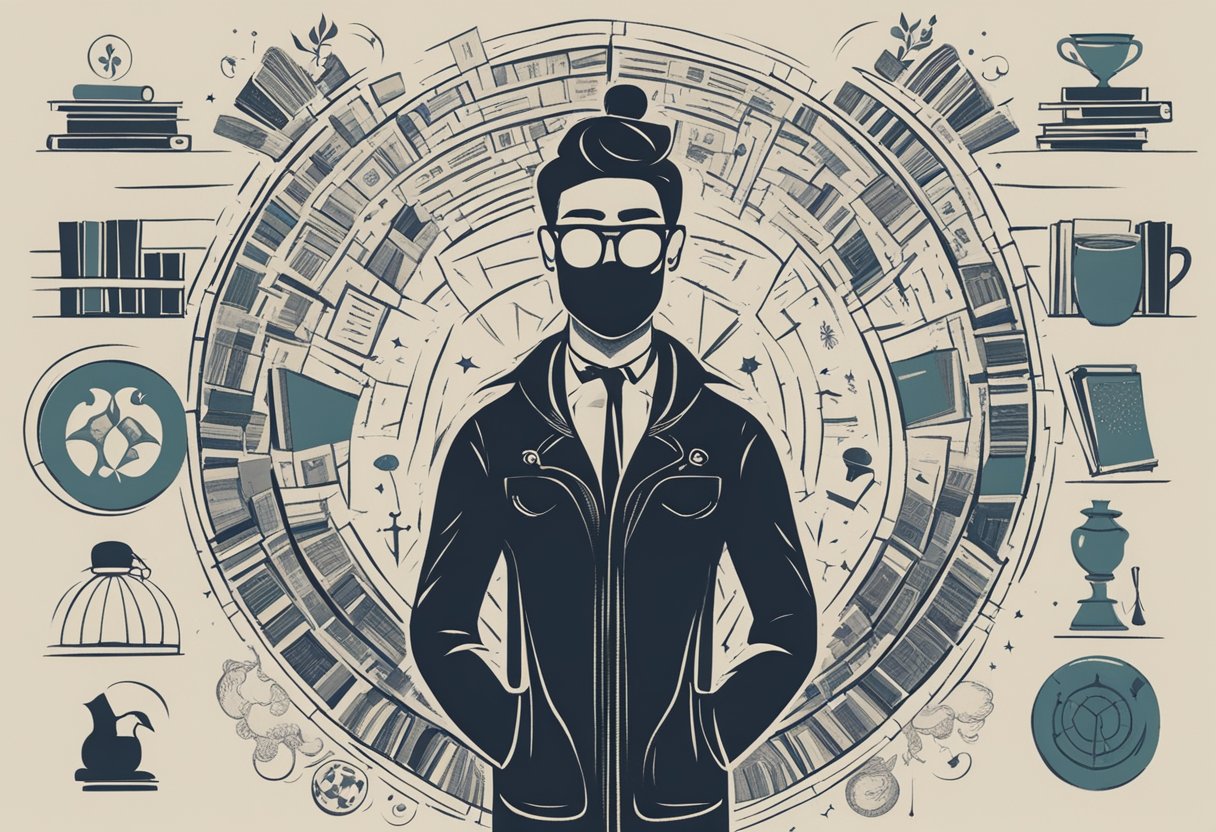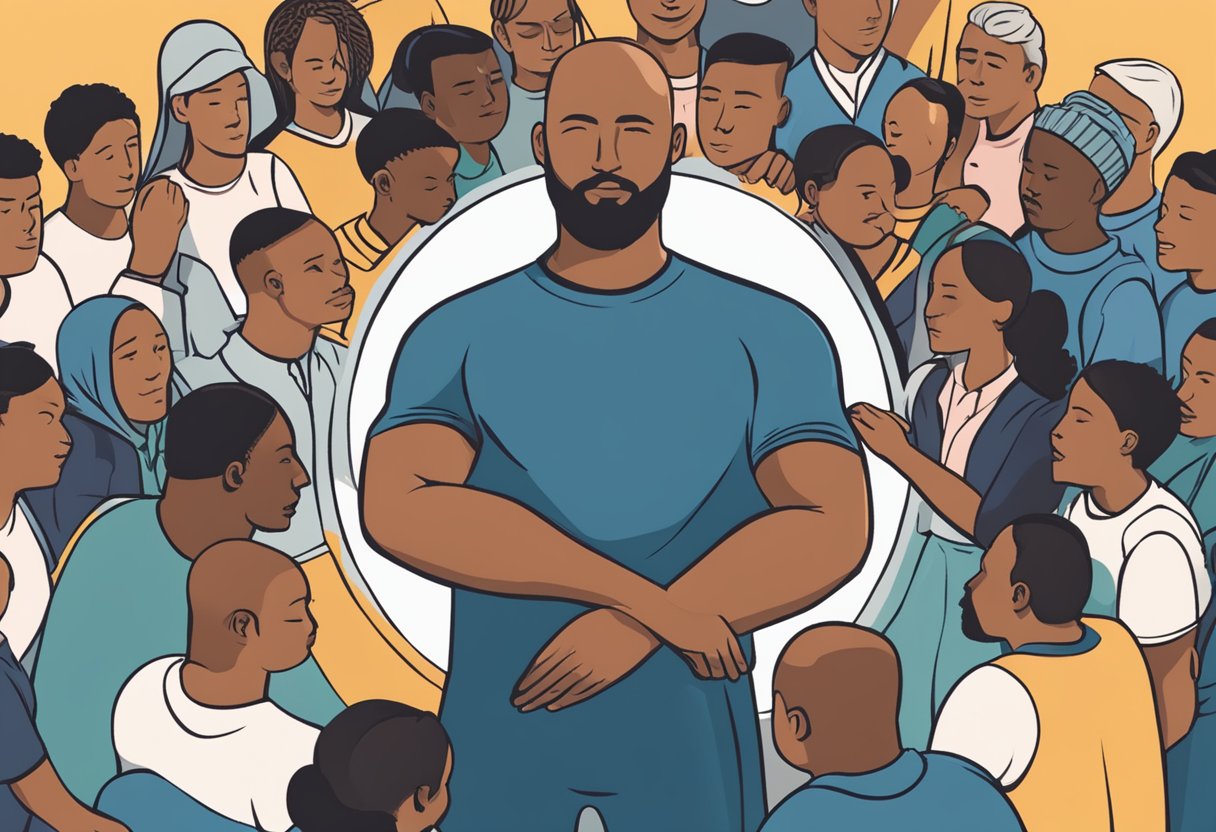A Journey of Strength and Resilience
Embracing vulnerability as a male cancer warrior means turning raw feelings into personal strength.
Surviving lymphoma twice, I’ve learned that sharing my emotional journey has been crucial in building genuine relationships.

Facing cancer head-on means navigating not only the physical battles but also the psychological challenges.
By acknowledging my vulnerability, I’ve found empowerment through knowledge and community support.
It’s about realizing that even in our weakest moments, there’s immense strength to be discovered and shared.
When I joined support groups, I understood the power of community in the healing process.
Engaging with others who share similar struggles has been transformative. These connections remind me that I am not alone and provide the encouragement needed to thrive.
Key Takeaways
- Vulnerability fosters solid and authentic relationships.
- Acknowledging weakness can be empowered through knowledge and support.
- Community support is essential for emotional and psychological healing.
Understanding Vulnerability in the Context of Cancer
Vulnerability takes on a new dimension for cancer patients, intertwining with emotional and physical challenges.
We can better comprehend its impact by examining its role and the emotions it brings.
Defining Vulnerability and Its Role for Cancer Patients
Vulnerability in cancer patients can manifest in multiple ways.
When I first battled lymphoma, I experienced not just the physical toll but a profound sense of emotional exposure. Vulnerability isn’t a weakness; it’s an essential part of the healing journey.
Vulnerability helps patients connect deeply with their caregivers and loved ones.
I found that sharing my fears and uncertainties fostered stronger, more authentic relationships. This openness allowed me to accept support and help, which was crucial during tough times.
Understanding that vulnerability is linked to the emotional, social, and physical aspects of cancer can guide patients toward seeking and accepting the necessary support.
For instance, studies indicate that changes in social vulnerability among cancer patients can occur, with many experiencing shifts in their status throughout their cancer journey.
The Interplay of Emotions and Cancer Diagnosis
When diagnosed with cancer, a flood of emotions is typical.
I felt an overwhelming mix of fear, sadness, and, eventually, acceptance. These emotions are part of what makes vulnerability so palpable during this time.
Fear often stems from the uncertainty of the future and the painful treatments ahead.
Acceptance, although challenging, comes from recognizing the reality of the diagnosis and finding ways to navigate through it.
The phenomenological analysis of cancer patients shows that vulnerability and resilience coexist, highlighting the complex emotional landscape.
Acknowledging and discussing these emotions is vital.
By openly addressing feelings with healthcare providers and loved ones, patients can make more meaningful connections and receive better emotional support.
Patients’ values and life choices are crucial in confronting these feelings, leading to a more comprehensive approach to their treatment and care.
The Male Cancer Experience
As a two-time lymphoma cancer survivor, I’ve navigated the landscape of masculinity and vulnerability.
My journey has taught me to embrace and share my emotional experiences, even when it feels uncomfortable.
Societal Views on Masculinity and Health
Society often portrays men as strong and stoic, discouraging them from showing vulnerability. This perception impacts how men approach their health and illness.
Many men hesitate to seek medical help or talk about their symptoms due to fear of appearing weak.
During my cancer journey, I learned the value of openness with my doctors and loved ones.
Sharing concerns about treatments and feelings of fear not only helped my mental health but also improved my medical care.
Embracing vulnerability allowed me to create a support network crucial for my recovery.
Impact of Stereotypes on Emotional Suppression
Stereotypes suggest men should hide their emotions.
This emotional suppression can be harmful, especially during a cancer journey.
Ignoring feelings of fear, sadness, or anxiety may lead to mental health issues and a sense of isolation.
During my battle with lymphoma, I realized the importance of expressing emotions.
Discussing my fears and hopes with family and friends fostered deeper connections and gave me the emotional support I needed.
Breaking free from stereotypes, I discovered strength in openness and honesty.
Engaging in support groups and therapy also played a vital role in my healing process.
Navigating Relationships and Communication

Cancer survivors often learn to embrace vulnerability and authenticity in their relationships. They may become more open about their feelings, fears, and hopes, fostering deeper connections.
This section explores how to build stronger connections and the challenges faced in family and intimate relationships.
Building Stronger Connections
In my experience as a two-time lymphoma survivor, authentic communication has been crucial.
Facing cancer taught me to share my true thoughts and feelings.
Open discussions can lead to trust and deeper emotional bonds.
Vulnerability isn’t a sign of weakness. It’s a method for creating genuine connections.
When I was honest about my fears, my friends and family responded with support.
Sharing hopes and celebrations also brought us closer.
It’s essential to foster these open lines of communication.
Active listening—an integral part of such conversations—makes others feel heard and appreciated.
Empathy plays a significant role, as it helps us understand each other’s perspectives.
For men with cancer, sharing feelings can feel foreign due to societal expectations about masculinity. Yet, it’s through embracing vulnerability that more vital connections form.
Authentic communication, therefore, isn’t just helpful; it’s transformative.
Challenges in Family and Intimate Relationships
Navigating family and intimate relationships during and after cancer treatment came with challenges.
The strain of illness often brought stress, misunderstanding, and emotional distance.
Open communication became a vital tool for overcoming these hurdles.
Expressing feelings of fear or frustration helped in addressing issues before they escalated.
In intimate relationships, the fear of being a burden sometimes made me withdraw.
This isolation could lead to misunderstandings and emotional disconnection.
Honest conversations about needs and emotions were essential in keeping intimacy alive.
It was about sharing my journey, including the struggles and the triumphs.
Family dynamics can change significantly during cancer treatment.
Roles often shift, and stress can strain bonds.
Open dialogue about these changes helps family members adjust and support each other effectively.
Asking for and accepting help is also fundamental.
These conversations encourage mutual support and understanding.
The Psychological Impact of Cancer

Facing cancer can bring a storm of emotional challenges, but it also opens doors to personal growth by fostering hope and resilience.
Dealing with Anger, Anxiety, and Loneliness
Anger often surfaces when understanding the unfairness of cancer.
I experienced deep anger towards my illness and the time it stole from my life.
Men’s health conversations around cancer can lead to anxiety, compounded by the fear of recurrence.
Anxiety hit hard, especially during the waiting periods for test results.
Loneliness cut deep. Cancer made me feel isolated, even when surrounded by loved ones.
Acknowledging these feelings and talking about them with support groups or therapists is crucial.
Building connections with people who understand these feelings can make a significant difference.
Open conversations about feelings help to confront and manage them effectively.
Cultivating Hope and Resilience
Despite the emotional turmoil, hope was my anchor.
Finding hope in small victories, like finishing a round of treatments, can propel a person forward.
Men often struggle to express vulnerability, but showing our true selves and sharing fears can build inner strength.
Resilience grows from these authentic interactions; resilience helps us bounce back from setbacks.
Support from friends, family, and healthcare providers also plays a crucial role.
Embracing my support network’s strength boosted my resilience.
Finding purpose in helping others facing similar battles made me stronger.
Volunteering, mentoring, or simply listening can make a huge difference.
These acts of vulnerability and support gave me the strength to keep fighting.
Striving for Empowerment Through Knowledge

Gaining knowledge about cancer and its treatment paths can help men feel more in control of their health journey.
They can make informed choices and feel less alone by seeking education and using available resources.
The Importance of Cancer Education
When I first faced lymphoma, understanding my condition was crucial.
Knowing the types of treatments available, such as chemotherapy, radiation, and immunotherapy, helped me weigh my options.
Education also aids in recognizing early symptoms, which is key for timely intervention.
Engaging in thorough research about cancer types and stages can clarify many doubts.
For example, reading articles and studies on patient empowerment detailed how knowledge boosts confidence and reduces vulnerability.
Talking to healthcare providers is essential, too. They offer insights that online resources might skip.
Regularly attending cancer education workshops can help.
These sessions provide updates on the latest treatment guidelines and research.
Ensuring that you’re informed can make decision-making processes smoother and less intimidating.
Finding and Utilizing Relevant Resources
In my experience, accessing the right resources made a significant difference.
Organizations like the American Cancer Society offer comprehensive guides on coping with various cancers. These resources detail everything from dietary plans to managing side effects.
Utilizing online platforms is also vital.
Websites like PubMed list research articles that explain advancements in cancer care and patient empowerment through community engagement. These articles often include real-life stories, which can be very motivating.
Support groups, both online and in-person, play a key role too.
Being part of these groups provides practical advice and emotional support.
Talking to other men who’ve faced similar battles helps lessen the feeling of isolation. It’s through these connections that we find strength and resilience.
The Role of Support and Community

Genuine connections within the cancer community and sharing personal experiences can make a huge difference.
From my journey, having a solid support network has transformed the fight against cancer into a more manageable battle.
Breaking Down Barriers in the Cancer Community
The cancer community can be a fortress for those like me who have battled lymphoma. A key to this fortress is breaking down barriers that isolate us.
When I first joined a support group, I discovered a place where vulnerability wasn’t a weakness but a strength. Sharing my fears and triumphs allowed me to connect deeply with others.
Many men, including myself, often struggle with discussing emotional and physical challenges. This reluctance can be a major barrier.
Encouraging honest conversations within the community has helped many of us realize that these feelings are shared and valid. This authenticity fosters solidarity and unity, making facing the daunting challenges of cancer together easier.
Volunteering and Sharing Experiences
Volunteering has provided me with a powerful outlet to give back and connect.
Volunteering at local hospitals and online forums has allowed me to meet fellow survivors and offer support. Being there for someone else can be as healing as receiving support.
Sharing personal experiences, no matter how tough, creates a ripple effect.
Men dealing with cancer often feel isolated, but by hearing my story, they realize they are not alone. This mutual exchange of stories and advice builds a strong community foundation.
I have found that expressing struggles and victories helps to lighten the emotional load for everyone involved.
Embracing the Journey: From Survivor to Thriver

This journey involves embracing both vulnerability and strength. It is transformative, ranging from celebrating survivorship to finding joy and gratitude amidst challenges.
Celebrating Survivorship and Advocacy
Having survived lymphoma twice, I realized that sharing my story can inspire others.
Survivorship involves more than just battling cancer; it’s about turning pain into purpose.
I decided to advocate for male cancer warriors by speaking at events and participating in support groups. This created a strong community around me.
Advocacy brings meaning to my experience.
Connecting with others who understand the journey, we share tips, offer support, and discuss personal victories. Celebrating survivorship through advocacy is a powerful way to turn a painful experience into an influential mission.
Finding Joy and Gratitude Amid Struggle
Struggling with cancer can make finding joy challenging, but it’s not impossible.
Daily gratitude practices transformed my outlook.
I began appreciating small moments, like a beautiful sunset or a kind word. This focused my energy on positivity.
Laughter became a vital part of my healing process. Watching funny movies or joking with friends brought much-needed relief.
Embracing humor helped me cope with the stress and uncertainty of my condition. Finding joy and expressing gratitude became essential tools in my emotional toolkit.
By focusing on what I could still enjoy and be thankful for, I shifted from merely surviving to thriving. This approach doesn’t eliminate struggles but enriches life amidst them.
The Debate
Acknowledging Vulnerability
Many men with cancer face a significant internal debate about vulnerability. Sharing fears and emotions can be challenging.
Yet, many find strength in opening up. I’ve experienced this firsthand, surviving lymphoma cancer twice.
Societal Pressures and Masculinity
Men often feel pressure to remain stoic and strong.
Society often equates masculinity with toughness, which can discourage emotional openness. I’ve seen this in support groups where men struggle to discuss their vulnerabilities.
Health Benefits
Embracing vulnerability can lead to better mental health.
Men who balance strength and vulnerability may experience improved emotional well-being.
This concept is supported by research, such as studies on emotional vulnerability in men’s mental health.
Personal Experience
When I opened up about my fears and hopes during my recovery, I built more profound connections with loved ones and fellow survivors.
This shared vulnerability created a supportive network vital to my healing process.
Conflicting Views
Not everyone agrees that vulnerability is beneficial for men with cancer.
Some argue that focusing on vulnerability might weaken one’s resolve. This viewpoint is seen in traditional discourses of masculinity, where vulnerability is viewed as a form of weakness.
Balancing Perspectives
There is a need for balance.
While some advocate for embracing emotions, others promote resilience and traditional strength.
The best path lies somewhere in between, where men can be strong and open about their feelings. This middle ground nurtures mental and physical health during and after cancer treatment.
Final Thoughts
Surviving lymphoma cancer twice taught me to embrace vulnerability. Opening up about my fears and hopes wasn’t easy, but it deepened my relationships with loved ones.
I found that sharing my journey allowed others to connect with me on a fundamental level. This bond becomes stronger and more authentic.
In connecting with other male cancer warriors, I realized that embracing vulnerability does not mean weakness. Instead, it fosters a profound strength. We become better teammates in our fight against cancer, supporting each other through shared experiences.
Cancer changes you. It makes you appreciate the little things and the relationships you hold dear. For me, the journey was humbling but also empowering.
Men often struggle with expressing emotions. Yet, being open about our struggles can lead to healing and growth. When we allow ourselves to be vulnerable, we invite others to do the same.
A solid support system is essential. Friends, family, and fellow survivors provide a network of care and understanding. These connections remind us that we are not alone in our journey.
If you’re a man battling cancer, know that vulnerability is a part of your strength. Let yourself feel, share, and connect. In doing so, you will find support and empowerment on your path to recovery. -T
Frequently Asked Questions
I often find that battling cancer is as much about mental resilience as it is about physical endurance. Here are some common questions and insights from my journey.
How can embracing vulnerability empower men battling cancer?
Embracing vulnerability allows men to face battles head-on and build authentic connections during treatment. Being open means they find support and understanding from loved ones, strengthening their emotional resilience.
What are the mental strategies for coping with a cancer diagnosis?
Mental strategies include setting small, manageable goals and practicing mindfulness.
Regular therapy or support group sessions also help in processing emotions and fears. These approaches offer clarity and peace amid the chaos.
What do words of encouragement mean for someone fighting cancer?
Words of encouragement provide immense strength.
Simple phrases like “You are not alone” or “Keep fighting” remind us that we’re supported and loved. These uplifting messages can make a world of difference during tough times.
How do cancer warriors find strength during their journey?
Strength often comes from a deep sense of purpose, whether family, personal dreams, or a desire to help others.
Exercise and nutrition also play a crucial role, giving us the physical stamina to continue the fight.
What role does vulnerability play in the lives of male cancer patients?
Vulnerability helps male cancer patients break down emotional barriers.
When they share their fears and anxieties, it becomes easier to receive emotional support. This openness leads to stronger, more genuine relationships.
In what ways can a cancer warrior’s perspective influence their fight against the disease?
A positive perspective can fuel our fight against cancer.
Focusing on small victories and maintaining hope boosts morale.
An optimistic outlook helps tackle challenges one day at a time, making the journey a bit easier.
